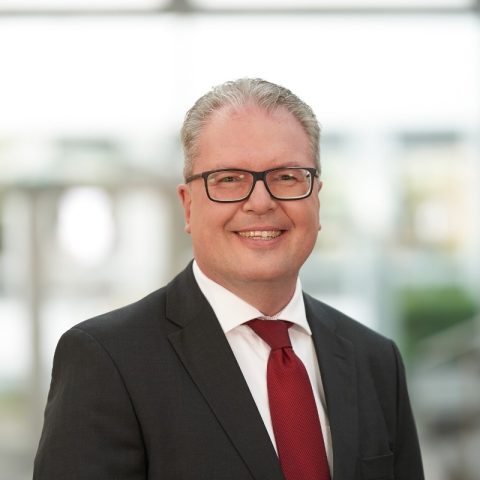DB Netze’s new freight coordinator: ‘Construction works are for the better, but I understand frustration’

As a new face at German infrastructure manager DB Netze, Thorsten Dieter aims for change. “My biggest accomplishment will be if, one year from now, the rail freight sector thinks it’s sufficiently represented by DB Netze”, he says.
Starting from 1 February, Thorsten Dieter is the overall coordinator of freight traffic at DB Netz. He is responsible for cross-border traffic from the infrastructure point of view, something that in his eyes needs a cooperative approach.
On 19 April, he will attend the RailFreight Summit Poland as a panelist. He will join the discussion about the role of the German railway network in providing efficient rail freight transport between Poland and the west of Europe. In the run-up to this event we asked him how he looks at the situation today.

Like a clockwork
“I want to smooth the way for the further growth of rail freight in Germany and Europe”, claims Dieter. His approach will be cooperative. “Cooperation” might sound overused regarding rail freight capacity allocation and network nuances. However, many would also claim that the sector needs this the most.
“We need a cooperative approach to squeeze the existing system in a way that works like a clockwork but offers as much transport volume as possible. Therefore I firmly believe that all European infrastructure must be driven by market needs – and I translate these needs for freight railway undertakings”, underlines Dieter.
Germany is in all networks
At the RailFreight Summit, which will take place in the capital city Warsaw, Dieter will discuss the possibilities of increasing capacity in the German railway network. “Germany is in most traffic flows, so all issues in Germany are directly seen and felt abroad.
“We need a common understanding of managing a corridor crossing one or more borders. During the event, I want to, first of all, explain the situation in Germany, show the reasons and point out possible measures for improvement”, he explains.
Customer frustration understandable
Although Dieter is new at the infrastructure manager, he is not new in the industry. He previously worked for DB Cargo Poland, as well as DB Cargo, DB Schenker and other rail freight companies. “I have been in the sector for 20 years, and I fully understand the frustration of customers”, he highlights. He continues saying that he’s felt the same frustration himself. The issue, in his opinion, is that the rail freight sector has been talking about growth for so many years and now that the growth is actually in place, managing it is challenging.
“Germany has understood too late that we need much more and much better infrastructure for rail in the country. Now the understanding and money are there, and as a consequence, there are construction works. The situation is improving, but overcoming the biggest hurdles takes years”, according to him.
The two primary issues that need to be addressed in Germany are the optimal utilisation of existing capacity and the knowledge concerning rail freight operations in relation to the infrastructure. “I want to explain the logic of rail freight, connect industry customers, railway undertakings and the infrastructure and speak the same language – that is one big step to get growth”, says Dieter, and he sounds right considering that one of the biggest complaints of railway undertakings from DB Netze in the past years was the lack of communication and business understanding.
Everyone has to do their homework
Dieter’s approach does not alter when it comes to international traffic. After all, Germany is not the only country undertaking construction works that nuance the traffic. Poland does the same, and Dieter is convinced that there is not “one big measure” that can resolve the bottlenecks resulting from infrastructure upgrades.
What he believes, though, is that pointing fingers at each other does not add any value or provide solutions to problems. “Everyone has to do their homework and work together to have a transparent view of the issues while looking for cooperative ways to solve them”, he adds.
Construction works are for the better
In his view, the holy grail of resolving network bottlenecks does not exist; yet, with openness and transparency, each problem can be addressed and resolved individually. As he underlines, construction works on both German and Polish networks are for the better and to meet the increasingly high transport demand.
He keeps a positive stance for the future. Construction should not be seen as the plague for railways but as a tool to optimise them, hopefully with better predictability. “The way ahead shows much more predictability of construction works. That should help coordinate the diversion routes much better in advance instead of dispatching trains on the spot”, concludes Dieter.
RailFreight Summit Poland
Do you want to follow the discussion about the German railway network at the Railfreight Summit Poland? You can attend this summit and join the discussion. Have a look at the programme or register for the event, which will take place on 19 & 20 April 2023 in Warsaw.






Those modes (transport devices…) handsomely rewarded, by willingly paying clients (all others…) are robust (redundant and resilient).
They upgrade…, for added load – and for lower costs, etc.!
At railways, however, now single option, for added load capacity, is longer trains…
Devastatingly (not optimal…) electrification is by overhead, etc., etc.
For sake of Market, of future demand, etc., now redundancy, safely has to be added railway infrastructure – and to its construction works!